Supersized Science
The Supersized Science podcast highlights research and discoveries nationwide enabled by advanced computing technology and expertise at the Texas Advanced Computing Center of the University of Texas at Austin. TACC science writer Jorge Salazar hosts Supersized Science.
RSS iTunesThis is a Freebox. You can put any valid HTML in here. Or disable this feature if you don't need it.
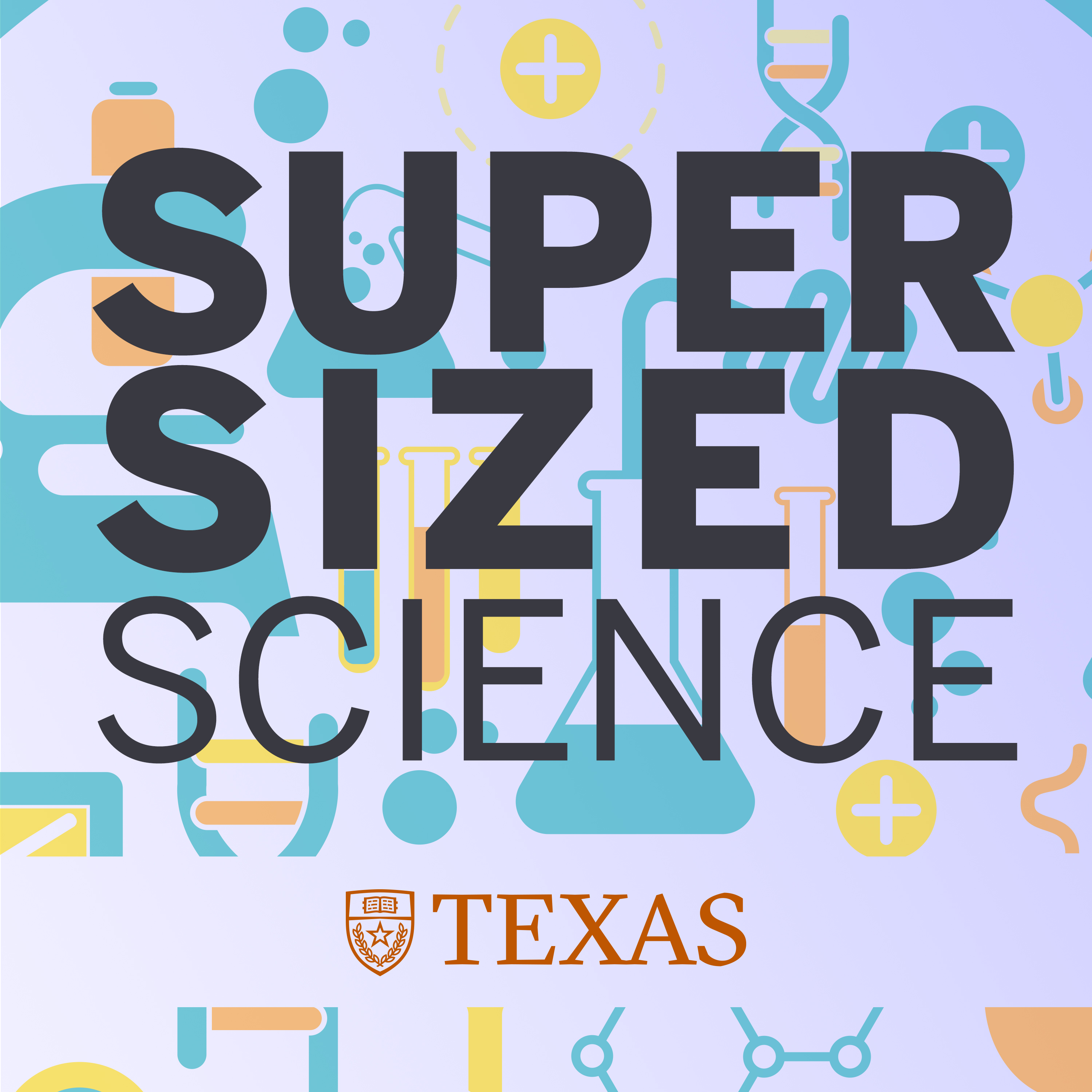
Hurricane Simulations in High Gear
2025-01-23
Scientists and supercomputers generate fast storm surge forecasts in 2024 to help protect lives and property
More DownloadFiletype: MP3 - Size: 26 MB - Duration: 17:54m (192 kbps 44100 Hz)
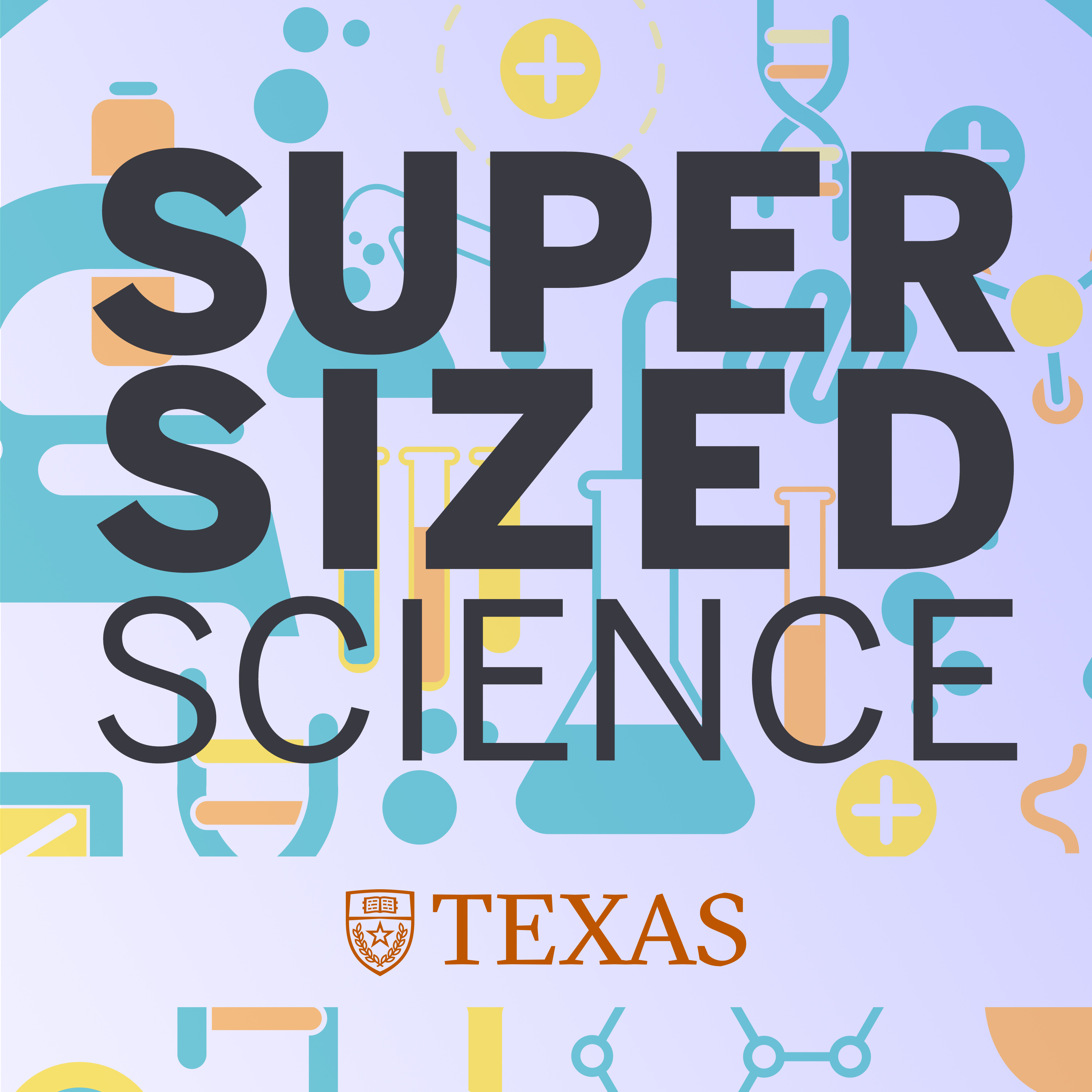
New Heights: The U.S. NSF Leadership-Class Computing Facility and Horizon
2024-11-19
SC24 podcast with Dan Stanzione, Executive Director of TACC / Associate Vice President for Research, UT Austin
More DownloadFiletype: MP3 - Size: 41 MB - Duration: 28:30m (192 kbps 44100 Hz)
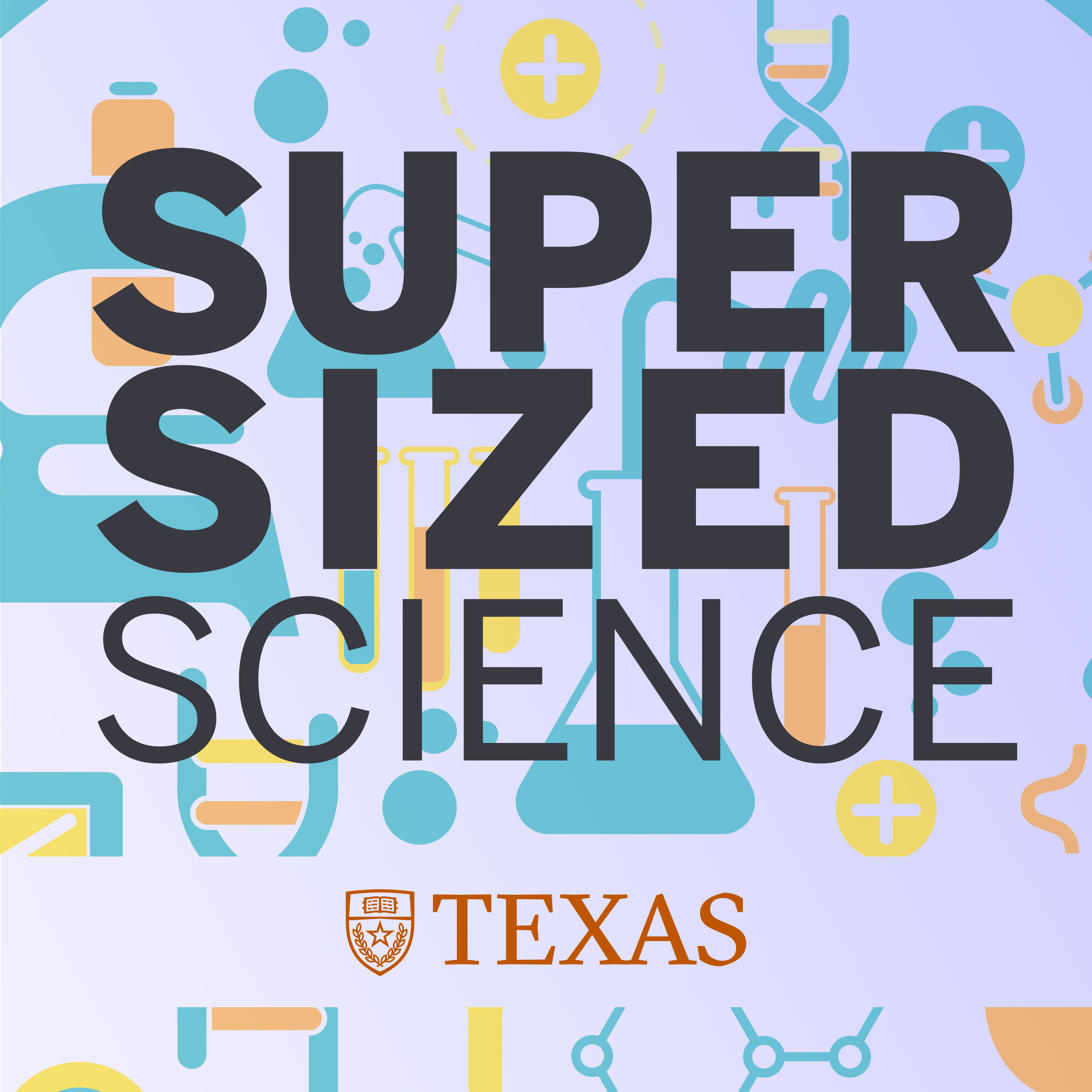
Surprising Vortex Behind New Solar Cell and Lighting Materials
2024-06-25
TACC Frontera, Lonestar6 supercomputer simulations reveal topological vortices in polaron quasiparticles
More DownloadFiletype: MP3 - Size: 14 MB - Duration: 9:56m (192 kbps 44100 Hz)
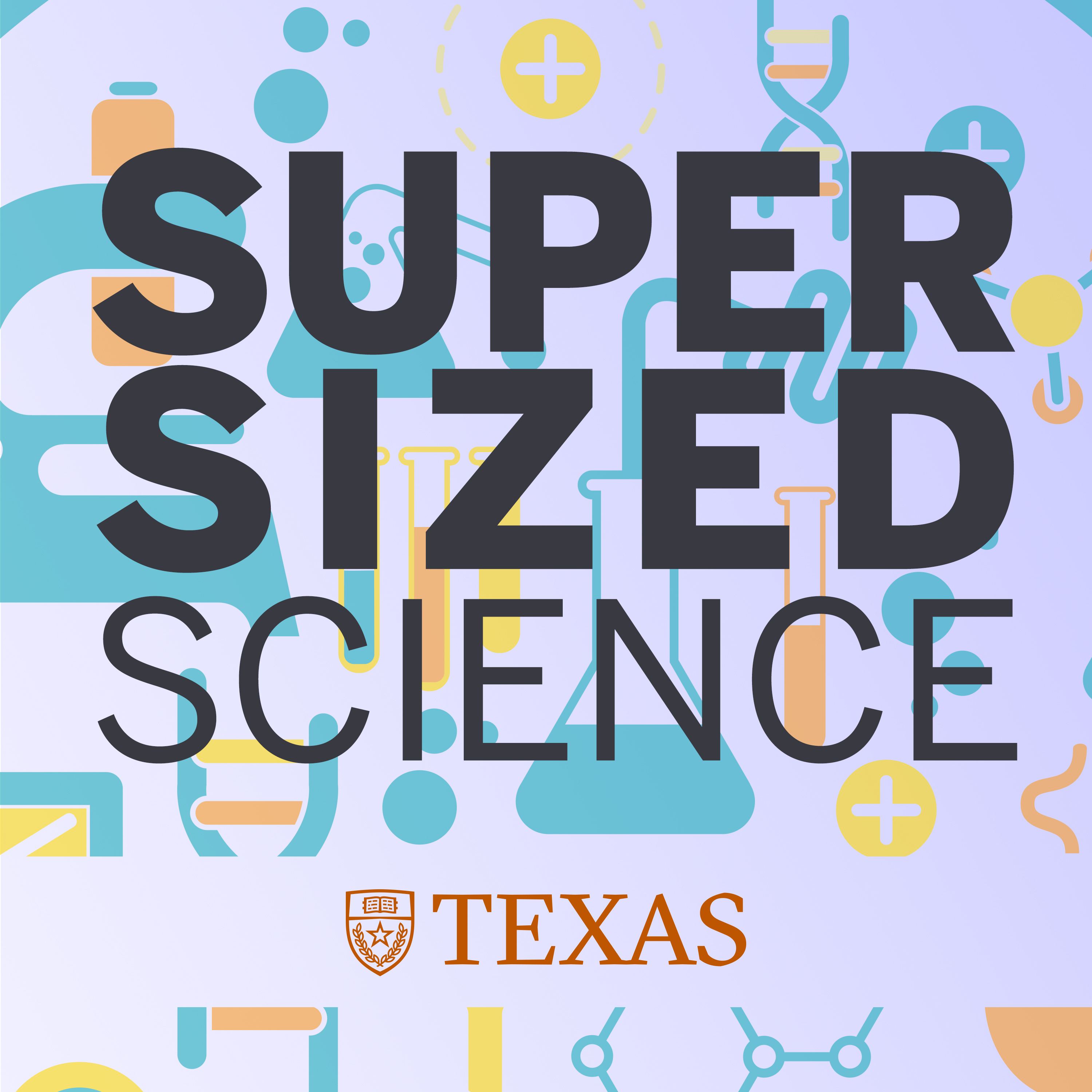
Diamond Heat
2024-05-29
Drastic changes in thermal conductivity of diamonds seen through simulations and machine learning using TACC’s Frontera supercomputer
More DownloadFiletype: MP3 - Size: 10 MB - Duration: 7:04m (192 kbps 44100 Hz)
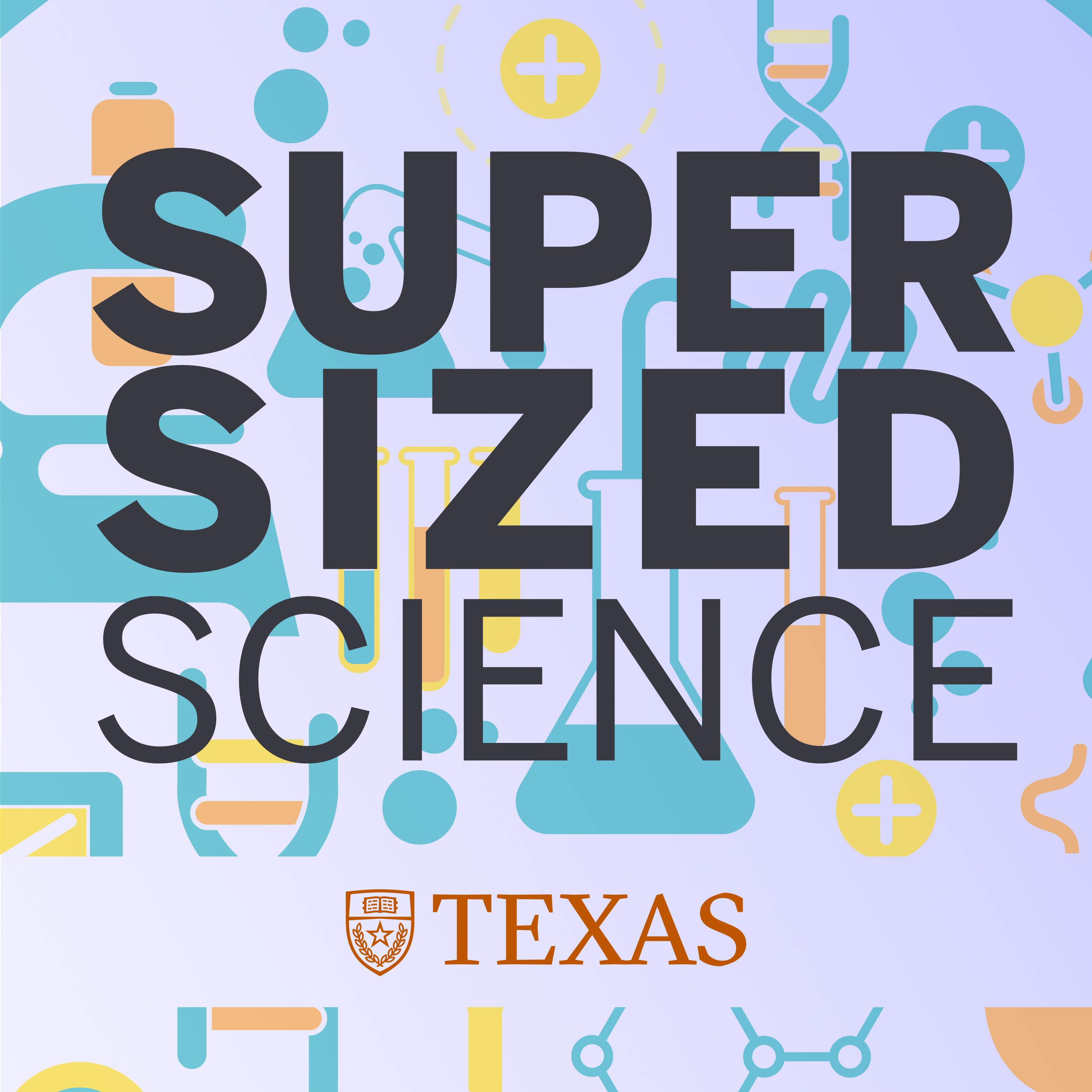
Cooler Transformers Could Help the Electric Grid
2024-04-16
Simulations on the Stampede2 supercomputer of the Texas Advanced Computing Center (TACC) are helping scientists engineer solutions to overheating of grid transformers — a critical component of the electric grid.
More DownloadFiletype: MP3 - Size: 11 MB - Duration: 8:00m (192 kbps 44100 Hz)

Supercomputing the Secrets Inside Cattle Antibiotics
2024-02-12
Scientists have found the crystal structure and unlocked the mechanism of activity of a family of enzymes that produce monensin, widely used as a cattle antibiotic.
More DownloadFiletype: MP3 - Size: 17.23 MB - Duration: 12:20m (192 kbps 44100 Hz)

DNA Origami Folded Into Tiny Motor
2024-01-19
Scientists have created the world's first working nanoscale electomotor. The science team designed a turbine engineered from DNA that is powered by hydrodynamic flow inside a nanopore, a nanometer-sized hole in a membrane of solid-state silicon nitride.
More DownloadFiletype: MP3 - Size: 22.55 MB - Duration: 16:13m (192 kbps 44100 Hz)

Cosmic Lights in the Forest
2023-12-20
ACC's Frontera supercomputer helped astronomers develop PRIYA, the largest suite of hydrodynamic simulations yet made of large-scale structure in the universe.
More DownloadFiletype: MP3 - Size: 15.61 MB - Duration: 11:09m (192 kbps 44100 Hz)

Scientific Supercomputing and AI
2023-11-13
SC23 podcast with Dan Stanzione, Executive Director of TACC / Associate Vice President for Research, UT Austin.
More DownloadFiletype: MP3 - Size: 17.42 MB - Duration: 12:27m (192 kbps 44100 Hz)

New Twist on Optical Tweezers
2023-10-31
Optical tweezers use laser light to manipulate small particles. A new method has been advanced using Stampede2 supercomputer simulations that makes optical tweezers safer to use for potential biological applications, such as cancer therapy.
More DownloadFiletype: MP3 - Size: 15.52 MB - Duration: 11:05m (192 kbps 44100 Hz)

Hot Jupiter Blows Its Top
2023-09-05
The planet HAT-P-32b is losing so much of its atmospheric helium that the trailing gas tails are among the largest structures yet known any planet outside our solar system.
More DownloadFiletype: MP3 - Size: 17.61 MB - Duration: 12:37m (192 kbps 44100 Hz)

Deep Learning for New Protein Design
2023-08-03
Deep learning methods augment existing energy-based physical models in ‘do novo' or from-scratch computational protein design, resulting in a 10-fold increase in success rates verified in the lab for binding a designed protein with its target protein.
More DownloadFiletype: MP3 - Size: 28.77 MB - Duration: 20:44m (192 kbps 44100 Hz)

Community Resilience from Earthquakes and Tsunamis
2023-06-20
Seaside, Oregon is focus of study for community resilience from hazardous earthquakes and tsunamis. Environmental data that included buildings, ground movement, and demographics were collected in work recognized with a 2023 DesignSafe Dataset Award.
More DownloadFiletype: MP3 - Size: 12.21 MB - Duration: 8:41m (192 kbps 44100 Hz)

California Flooding from the Arkstorm
2023-06-06
The ARkStorm 2.0 simulations build upon a scenario developed in 2010 by the US Geological Survey, where large atmospheric rivers dump extreme quantities of rainfall over California and cause widespread flooding.
More DownloadFiletype: MP3 - Size: 16.41 MB - Duration: 11:44m (192 kbps 44100 Hz)

Brain Games Reveal Clues on How the Mind Works
2023-04-27
Deep learning models developed in task-DyVa framework to generate realistic cognitive response time data.
More DownloadFiletype: MP3 - Size: 21.73 MB - Duration: 15:36m (192 kbps 44100 Hz)

New Simulation Reveals Secrets of Exotic Form of Electrons Called Polarons
2023-03-22
Conditions mapped for the first time of polaron characteristics in 2D materials.
More DownloadFiletype: MP3 - Size: 24.21 MB - Duration: 17:24m (192 kbps 44100 Hz)

Rare Quasar Triplet Forms Most Massive Object in Universe
2023-03-13
Origin of ultra-massive black holes revealed through supercomputer simulations.
More DownloadFiletype: MP3 - Size: 14.2 MB - Duration: 10:07m (192 kbps 44100 Hz)

HETDEX Reveals Galaxy Gold Mine in First Large Survey
2023-02-09
The Hobby-Eberly Telescope Dark Energy Experiment (HETDEX) announced their first publicly released catalog of astronomical objects.
More DownloadFiletype: MP3 - Size: 21.44 MB - Duration: 15:24m (192 kbps 44100 Hz)

New Quasiparticle Discovered In Moiré Patterns
2022-11-07
New kind of exciton discovered with novel characteristics in moiré crystal superlattice.
More DownloadFiletype: MP3 - Size: 23.87 MB - Duration: 17:10m (192 kbps 44100 Hz)

Nuclear Crossing Guard
2022-10-12
New mechanism determined for passive transport of biomolecules through the nuclear pore complex of cells.
More DownloadFiletype: MP3 - Size: 18.51 MB - Duration: 13:16m (192 kbps 44100 Hz)

First Stars and Black Holes
2022-08-11
Cosmological hydrodynamic zoom-in simulations used to study gravity hydrodynamics, chemistry and cooling in structure formation and early star formation.
More DownloadFiletype: MP3 - Size: 28.05 MB - Duration: 20:13m (192 kbps 44100 Hz)

Deep Learning for New Alloys
2022-06-20
Supercomputer simulations are helping scientists discover new high-entropy alloys.
More DownloadFiletype: MP3 - Size: 18.6 MB - Duration: 13:20m (192 kbps 44100 Hz)

Supercomputer Helps Reveal Weaknesses in HIV-1 ‘Armor'
2022-06-16
First realistic simulations developed of HIV-1 capsid, which encloses its genetic material.
More DownloadFiletype: MP3 - Size: 14.07 MB - Duration: 10:02m (192 kbps 44100 Hz)

Cooperation Rewards Water Utilities
2022-05-19
Inter-utility water agreements can help mitigate their risks, in research that used supercomputer simulations of water supply in the North Carolina Research Triangle.
More DownloadFiletype: MP3 - Size: 19.44 MB - Duration: 13:57m (192 kbps 44100 Hz)

Devil in the Coronavirus Fusion Details
2022-05-04
Simulations suggest coronavirus fusion mechanism shows cooperative behavior of host cell receptor proteins that leads to infection. Coarse-grained models took cryo-electron tomography data and combined it with atomistic molecular dynamics simulations.
More DownloadFiletype: MP3 - Size: 18.37 MB - Duration: 13:10m (192 kbps 44100 Hz)

Pioneering Simulations Focus On HIV-1 Virus
2022-04-05
First-ever biologically authentic computer model completed of the HIV-1 virus liposome.
More DownloadFiletype: MP3 - Size: 22.55 MB - Duration: 16:12m (192 kbps 44100 Hz)

Cell's Energy Secrets Revealed With Supercomputers
2022-04-05
Supercomputer simulations have revealed for the first time how the cell's mitochondrial voltage-dependent anion channel (VDAC) binds to the enzyme hexokinase-II (HKII).
More DownloadFiletype: MP3 - Size: 24.08 MB - Duration: 17:19m (192 kbps 44100 Hz)

Into the Vortex
2022-04-01
Vortex dynamics simulations reveal reconnection, an important property linked with creation of turbulence cascade, fluid mixing, and aerodynamic noise generation.
More DownloadFiletype: MP3 - Size: 29.4 MB - Duration: 21:12m (192 kbps 44100 Hz)

Hawaiian Emperor Undersea Mystery Revealed With Supercomputers
2022-03-31
Kinematic plate reconstructions and high-res global dynamic models developed to quantify the amount of Pacific Plate motion change associated with the Hawaiian– Emperor Bend XSEDE allocations on TACC Stampede2; NSF-funded Frontera supported studies.
More DownloadFiletype: MP3 - Size: 22.38 MB - Duration: 16:05m (192 kbps 44100 Hz)

Supercomputers Help Reveal Dynamic Plastic-Eating Duo
2021-12-10
NREL scientists discover synergy in PET plastic-degrading enzymes using TACC, SDSC resources
More DownloadFiletype: MP3 - Size: 43.68 MB - Duration: 31:34m (192 kbps 44100 Hz)

What Happens When A Meteor Hits The Atmosphere?
2021-11-05
XSEDE-allocated Stampede2 supercomputer simulations shed light on meteor physics
More DownloadFiletype: MP3 - Size: 29.36 MB - Duration: 21:09m (192 kbps 44100 Hz)

Getting To The Core Of HIV Replication
2021-04-01
HIV-1 viral capsid simulations on XSEDE-allocated Stampede2, Bridges, Darwin systems uncover nucleotide entry mechanism
More DownloadFiletype: MP3 - Size: 35.08 MB - Duration: 25:17m (192 kbps 44100 Hz)

Complete Coronavirus Model
2021-03-04
Frontera, Anton 2 supercomputers simulate holistic model of SARS-CoV-2 virion
More DownloadFiletype: MP3 - Size: 21.88 MB - Duration: 15:41m (192 kbps 44100 Hz)

Targeting the Deadly Coils of Ebola
2021-01-21
Stampede2, Bridges supercomputer simulations show weak spots in Ebola virus nucleocapsid
More DownloadFiletype: MP3 - Size: 37.04 MB - Duration: 26:44m (192 kbps 44100 Hz)

Corona's Ladder
2020-07-27
Computer model simulating binding and fusing dynamics of the coronavirus on Longhorn, a subsystem of the Frontera supercomputer at the Texas Advanced Computing Center. Research supported by the COVID-19 High Performance Computing Consortium.
More DownloadFiletype: MP3 - Size: 26.42 MB - Duration: 19:01m (192 kbps 44100 Hz)

Sugar Coating Locks And Loads Coronavirus For Infection
2020-07-27
NSF-funded Frontera supercomputer at TACC used for simulations that animated the molecular dynamics of the 1.7 million atom coronavirus spike protein system.
More DownloadFiletype: MP3 - Size: 24.86 MB - Duration: 17:52m (192 kbps 44100 Hz)

Coronavirus Massive Simulations Completed on Frontera Supercomputer
2020-03-30
Scientists prepared a massive computer model of the coronavirus expected to give insight into how it infects. They've tested the first parts of the model and optimizing code on the Frontera supercomputer at the Texas Advanced Computing Center of UT Austin
More DownloadFiletype: MP3 - Size: 14.08 MB - Duration: 10:01m (192 kbps 44100 Hz)

Supercomputers Drive Ion Transport Research
2020-03-04
TACC's Stampede2 supercomputer powers path-sampling molecular simulations
More DownloadFiletype: MP3 - Size: 21.13 MB - Duration: 15:09m (192 kbps 44100 Hz)

Simulations Reveal Galaxy Clusters Details
2020-02-06
Galaxy clusters probed with Stampede2, Comet Supercomputers
More DownloadFiletype: MP3 - Size: 30.99 MB - Duration: 22:20m (192 kbps 44100 Hz)

Skin Cancer Mystery Revealed in Yin and Yang Protein
2019-12-18
Scientists used supercomputers to uncover the mechanism that activates cell mutations found in about 50% of melanomas. XSEDE allocations on TACC's Stampede2 and Bridges at PSC modeled the B-Raf protein and others in the pathway linked to skin cancer.
More DownloadFiletype: MP3 - Size: 27.98 MB - Duration: 20:08m (192 kbps 44100 Hz)

Frontera Helps the Science That Transforms Society
2019-09-16
TACC Podcast interviews Fleming Crim, COO of National Science Foundation
More DownloadFiletype: MP3 - Size: 13.13 MB - Duration: 9:21m (192 kbps 44100 Hz)

UT Austin President Greg Fenves On The Frontera Supercomputer
2019-09-08
UT Austin achieves leadership role in high performance computing for science with Frontera system
More DownloadFiletype: MP3 - Size: 7.17 MB - Duration: 4:59m (192 kbps 44100 Hz)

Science On Repeat - Computational Reproducibility
2019-04-19
TACC enhances computational reproducibility
More DownloadFiletype: MP3 - Size: 20.99 MB - Duration: 15:02m (192 kbps 44100 Hz)

Supercomputers Help Supercharge Protein Assembly
2019-04-16
XSEDE Allocations On Stampede2 and Comet Speed Simulation of Protein Oligomers
More DownloadFiletype: MP3 - Size: 28.35 MB - Duration: 20:23m (192 kbps 44100 Hz)

Closing the Workforce Gap
2019-03-25
Educating the next generation of supercomputing professionals
More DownloadFiletype: MP3 - Size: 26.88 MB - Duration: 19:19m (192 kbps 44100 Hz)

Award-Winning Visualization Dives Into Arctic Ocean
2019-03-25
Stampede2, Maverick systems at TACC help power visualization of Arctic Ocean data
More DownloadFiletype: MP3 - Size: 9.3 MB - Duration: 6:33m (192 kbps 44100 Hz)

A New Way to See Stress — Using Supercomputers
2019-03-25
Stressed materials show asymmetric distributions in simulations on Comet and Jetstream supercomputers through XSEDE allocations
More DownloadFiletype: MP3 - Size: 17.38 MB - Duration: 12:26m (192 kbps 44100 Hz)

Simulations Show New Phenomenon with Nanopore DNA Sequencing
2019-03-25
Stampede1, Stampede2, Blue Waters nanopore simulations could help improve medical diagnostics
More DownloadFiletype: MP3 - Size: 24.12 MB - Duration: 17:19m (192 kbps 44100 Hz)

A New 'Frontera' For Science Discoveries
2019-03-25
XSEDE-allocated resources at TACC and PSC, together with other national resources model inositol phosphate interactions with HIV-1 structural proteins
More DownloadFiletype: MP3 - Size: 8.17 MB - Duration: 5:44m (192 kbps 44100 Hz)

Supercomputers Help Design Mutant Enzyme That Eats Plastic Bottles
2019-03-25
XSEDE allocation on Stampede2 and Comet systems simulate PETase enzyme interactions
More DownloadFiletype: MP3 - Size: 27.65 MB - Duration: 19:53m (192 kbps 44100 Hz)

Supercomputing Material Emergence
2018-05-21
Artificial protein assembly could help create new materials for renewable energy, medicine, water purification, and more.
More DownloadFiletype: MP3 - Size: 31.42 MB - Duration: 22:39m (192 kbps 44100 Hz)

Catching Mantle Plumes by their Magma Tails
2018-05-21
Mantle plume simulations could help guide future deep Earth exploration and save cost of large-scale ocean-bottom seismometer deployments.
More DownloadFiletype: MP3 - Size: 20.57 MB - Duration: 14:45m (192 kbps 44100 Hz)

Catching Yellowtail Fish Genome With Big Data
2018-05-21
California Yellowtail genome assembly and annotation could potentially help in its sustainable harvest.
More DownloadFiletype: MP3 - Size: 26.52 MB - Duration: 19:05m (192 kbps 44100 Hz)

Spotlight on Quantum Computing at SXSW 2018
2018-03-08
TACC scientist Antia Lamas-Linares speaks at South by Southwest Conference.
More DownloadFiletype: MP3 - Size: 40.05 MB - Duration: 28:56m (192 kbps 44100 Hz)

AAAS 2018 - AI And Water Management with Suzanne Pierce of TACC
2018-02-14
Suzanne Pierce of the Texas Advanced Computing Center leads panel on bridging advanced computing with Earth science.
More DownloadFiletype: MP3 - Size: 40.47 MB - Duration: 29:14m (192 kbps 44100 Hz)

Supercomputing More Light Than Heat
2018-01-26
XSEDE's Maverick helps explore next generation solar cells and LEDs.
More DownloadFiletype: MP3 - Size: 21.32 MB - Duration: 15:17m (192 kbps 44100 Hz)

Silky Secrets to Make Bones
2017-12-06
XSEDE systems Stampede1 and Comet help sample protein folding in bone regeneration study.
More DownloadFiletype: MP3 - Size: 28.01 MB - Duration: 20:09m (192 kbps 44100 Hz)

Cosmos Code Helps Probe Space Oddities
2017-11-02
XSEDE ECSS program helps optimize astrophysics code for Knights Landing processors on Stampede2 supercomputer.
More DownloadFiletype: MP3 - Size: 26.15 MB - Duration: 18:49m (192 kbps 44100 Hz)

Buildings vs. Earthquakes: High School Students Learn the Science
2017-08-24
Code@TACC DesignSafe summer STEM camp sharpens civil engineering and computational skills for high school students.
More DownloadFiletype: MP3 - Size: 15.11 MB - Duration: 10:47m (192 kbps 44100 Hz)

Podcast - UT President Greg Fenves on Stampede2 Supercomputer
2017-07-28
UT Austin President Greg Fenves on Stampede2 supercomputer: "Stampede2 computer will allow us to solve much bigger, much tougher problems."
More DownloadFiletype: MP3 - Size: 5.13 MB - Duration: 3:31m (192 kbps 44100 Hz)

Code @ TACC Wearables Summer Camp
2017-07-25
Code@TACC Wearables summer STEM camp covers ‘Internet of Things.'
More DownloadFiletype: MP3 - Size: 7.72 MB - Duration: 5:24m (192 kbps 44100 Hz)

A Retrospective Look at the Stampede Supercomputer - Science Highlights
2017-07-20
A look back at the technology, science accomplishments of the Stampede supercomputer at TACC.
More DownloadFiletype: MP3 - Size: 28.92 MB - Duration: 20:50m (192 kbps 44100 Hz)

A Retrospective Look at the Stampede Supercomputer - The Technology
2017-07-19
A look back at the technology, science accomplishments of the Stampede at TACC.
More DownloadFiletype: MP3 - Size: 24.83 MB - Duration: 17:50m (192 kbps 44100 Hz)

Code @TACC Robotics Camp delivers on self-driving cars
2017-07-03
High School summer STEM camp teaches robotics to underserved Central Texas students.
More DownloadFiletype: MP3 - Size: 11.83 MB - Duration: 8:24m (192 kbps 44100 Hz)

Reaching for the Stormy Cloud with Chameleon
2017-05-04
Some scientists dream about big data. Computer scientists developed a way for parallel and Hadoop file systems to talk to each other, tailored for NASA with help from the NSF-funded Chameleon cloud testbed.
More DownloadFiletype: MP3 - Size: 17.52 MB - Duration: 12:33m (192 kbps 44100 Hz)

When Data's Deep, Dark Places Need to be Illuminated
2017-02-07
Human trafficking is being fought with the help of a supercomputer in a Defense Department DARPA project.
More DownloadFiletype: MP3 - Size: 32.87 MB - Duration: 23:42m (192 kbps 44100 Hz)

How to See Living Machines
2016-12-02
XSEDE Stampede supercomputer models 3-D human pre-initiation complex
More DownloadFiletype: MP3 - Size: 21.1 MB - Duration: 15:09m (192 kbps 44100 Hz)

Lori Diachin Highlights Supercomputing Technical Program
2016-12-02
Supercomputing focus on exascale architectures, cognitive computing, diversity, and more
More DownloadFiletype: MP3 - Size: 16.18 MB - Duration: 11:34m (192 kbps 44100 Hz)

John McCalpin Surveys Memory Bandwidth of Supercomputers
2016-12-02
History and strategies of memory bandwidth vs. computation outlined at SC16
More DownloadFiletype: MP3 - Size: 33.49 MB - Duration: 24:09m (192 kbps 44100 Hz)

Sadasivan Shankar Proposes Co-design 3.0 for Supercomputing
2016-12-02
Lego-like modularity recommended for architecture, hardware, algorithms, software, applications
More DownloadFiletype: MP3 - Size: 29.64 MB - Duration: 21:19m (192 kbps 44100 Hz)

Kelly Gaither Starts Advanced Computing for Social Change
2016-12-02
XSEDE, SC16, and TACC host week-long event to engage students in computing challenge
More DownloadFiletype: MP3 - Size: 28.95 MB - Duration: 20:51m (192 kbps 44100 Hz)

John West Leads Diversity Efforts in Supercomputing
2016-12-02
Several long-term efforts underway at Supercomputing Conference to build up diversity
More DownloadFiletype: MP3 - Size: 23.76 MB - Duration: 17:05m (192 kbps 44100 Hz)

New Hikari Supercomputer Starts Solar HVDC
2016-09-16
First supercomputer in U.S. that uses solar and HVDC launched by New Energy and Industrial Technology Development Organization (Japan), NTT FACILITIES, INC., and the University of Texas at Austin.
More DownloadFiletype: MP3 - Size: 15.43 MB - Duration: 11:01m (192 kbps 44100 Hz)

Soybean science blooms with supercomputers
2016-08-16
It takes a supercomputer to grow a better soybean. A project called the Soybean Knowledge Base, or SoyKB for short, wants to do just that. Scientists at the University of Missouri-Columbia made SoyKB a publicly-available web resource for all soybean data.
More DownloadFiletype: MP3 - Size: 15.8 MB - Duration: 11:17m (192 kbps 44100 Hz)

Supercomputers Fire Lasers to Shoot Gamma Ray Beam
2016-07-11
TACC Stampede, Lonestar supercomputers help discover gamma ray creation from lasers
More DownloadFiletype: MP3 - Size: 18.4 MB - Duration: 13:10m (192 kbps 44100 Hz)

UT Chancellor William McRaven on TACC supercomputers - "We need to be the best in the world"
2016-06-14
UT System Chancellor William McRaven spoke of his path to lead the UT System of 14 Institutions, the importance of supercomputers to Texans and to the nation, the new Dell Medical School, and more.
More DownloadFiletype: MP3 - Size: 9.29 MB - Duration: 6:44m (192 kbps 44100 Hz)

Zika Hackathon Fights Disease with Big Data
2016-05-24
More than 50 volunteer programmers gathered in Austin on May 15 to use Big Data to fight the spread of Zika.
More DownloadFiletype: MP3 - Size: 11.03 MB - Duration: 7:50m (192 kbps 44100 Hz)

Sudden Collapse: Supercomputing Spotlight on Gels
2016-05-03
Cornell researcher Roseanna Zia simulates gel behavior with XSEDE, Stampede supercomputer.
More DownloadFiletype: MP3 - Size: 15.81 MB - Duration: 11:17m (192 kbps 44100 Hz)

Docker for Science
2016-04-28
Joe Stubbs of the Texas Advanced Computing Center describes potential benefits to scientists of open container platform Docker in supporting reproducibility, NSF-funded Agave API.
More DownloadFiletype: MP3 - Size: 19.57 MB - Duration: 14:02m (192 kbps 44100 Hz)

Dark Energy of a Million Galaxies
2016-04-01
UT Austin astronomer Steven Finkelstein eyes Wrangler supercomputer for HETDEX extragalactic survey.
More DownloadFiletype: MP3 - Size: 17.07 MB - Duration: 12:13m (192 kbps 44100 Hz)

Human Origins in Fossil Data
2016-04-01
Paleoanthropologist Denne Reed of UT Austin connects fossil data of human origins.
More DownloadFiletype: MP3 - Size: 14.45 MB - Duration: 10:17m (192 kbps 44100 Hz)

Supercomputers Save Money, Save Energy
2016-04-01
Computer scientist Joshua New of Oak Ridge National Laboratory optimizes buildings to save energy.
More DownloadFiletype: MP3 - Size: 15.07 MB - Duration: 10:46m (192 kbps 44100 Hz)

Evolution of Monogamy
2016-04-01
UT Austin biologist Rebecca Young traces the genes behind monogamous behavior using Wrangler supercomputer.
More DownloadFiletype: MP3 - Size: 11.52 MB - Duration: 8:10m (192 kbps 44100 Hz)

Wrangler Supercomputer Speeds through Big Data
2015-12-04
NSF-funded Wrangler supercomputer tailored for big data, augments Stampede and other XSEDE resources.
More DownloadFiletype: MP3 - Size: 21.55 MB - Duration: 15:27m (192 kbps 44100 Hz)

SC15: ACM Gordon Bell Prize Winners Supercompute Deep Earth
2015-11-24
Stampede supercomputer at TACC and IBM Sequoia at Lawrence Livermore National Laboratory help win 'Oscar' of high performance computing at SC15.
More DownloadFiletype: MP3 - Size: 34.4 MB - Duration: 24:47m (192 kbps 44100 Hz)

SC15: Revealing the Hidden Universe with Supercomputing Simulations of Black Hole Mergers
2015-11-24
One hundred years since Einstein's equations, scientists have probed the mysteries of black holes using the supercomputing resources of XSEDE including Blue Waters, Gordon, Comet and Stampede.
More DownloadFiletype: MP3 - Size: 21.01 MB - Duration: 15:04m (192 kbps 44100 Hz)

SC15: Societal Impact of Earthquake Simulations at Extreme Scale
2015-11-24
Supercomputing resources of XSEDE including Stampede are making a big difference in helping anticipate and plan for earthquakes.
More DownloadFiletype: MP3 - Size: 16.02 MB - Duration: 11:28m (192 kbps 44100 Hz)

SC15: Science Advocate and Emmy Award Winning Actor Alan Alda to Open SC15
2015-11-24
Alan Alda, founder of the Alan Alda Center for Communicating Science at Stony Brook University, gives the keynote presentation at the SC15 supercomputing conference about the urgency for clear and accurate communication in high performance computing.
More DownloadFiletype: MP3 - Size: 16.49 MB - Duration: 11:48m (192 kbps 44100 Hz)

SC15: Understanding User-Level Activity on Today's Supercomputers with XALT
2015-11-12
Robert McLay of TACC co-leads a session at the SC15 supercomputing conference about XALT, a software tool that drills down on supercomputer analytics to the level of individual batch submissions, users, and binaries.
More DownloadFiletype: MP3 - Size: 13.38 MB - Duration: 9:31m (192 kbps 44100 Hz)

Supercomputing Coral's Race to Beat Heat
2015-10-07
UT Austin's Lonestar supercomputer helps biologists save reef-building corals
More DownloadFiletype: MP3 - Size: 12.21 MB - Duration: 8:41m (192 kbps 44100 Hz)

Supercomputers Listen to the Heart
2015-08-24
TACC supercomputers model native and replacement heart valve function to evolve human replacements
More DownloadFiletype: MP3 - Size: 13.5 MB - Duration: 9:39m (192 kbps 44100 Hz)

Supercomputers Surprisingly Link DNA Crosses to Cancer
2015-06-16
UT Austin researchers find hotspots of genetic instability in cancer using Stampede and Lonestar
More DownloadFiletype: MP3 - Size: 13.73 MB - Duration: 9:52m (192 kbps 44100 Hz)

Earthquakes Reveal Deep Secrets Beneath East Asia
2015-05-18
XSEDE Campus Champions, Stampede and Lonestar4 supercomputers of TACC help create 3D images deep underground.
More DownloadFiletype: MP3 - Size: 13.3 MB - Duration: 9:33m (192 kbps 44100 Hz)

Computer-Designed Rocker Protein World's First to Biomimic Ion Transport
2015-04-07
XSEDE resource Stampede supercomputer of TACC simulated molecular dynamics in design of engineered protein.
More DownloadFiletype: MP3 - Size: 10.63 MB - Duration: 7:38m (192 kbps 44100 Hz)

SXSW 2015: A Next Generation Platform For Open Data
2015-03-13
Matthew Hanlon and Matthew Vaughn of TACC present a SXSW 2015 core conversation that shares their experiences building the Arabidopsis Information Portal and explains how others interested in open data portals can benefit.
More DownloadFiletype: MP3 - Size: 8.91 MB - Duration: 6:27m (192 kbps 44100 Hz)

SXSW 2015: ScaaS & Other Lies: Hacking Big Data on the Web
2015-03-13
John Fonner and Rion Dooley of TACC present a SXSW 2015 workshop that explores new ways big data and computational science are done and that gives hands-on experience to approaching science as a service.
More DownloadFiletype: MP3 - Size: 14.02 MB - Duration: 10:10m (192 kbps 44100 Hz)

SXSW 2015: Science + Tech Meet Up: Scientists and Geeks Unite
2015-03-13
Maytal Dahan of TACC presents a SXSW 2015 meetup that brings together scientists, developers, and researchers to share skills and expertise on the newest web technologies and science projects.
More DownloadFiletype: MP3 - Size: 6.67 MB - Duration: 4:49m (192 kbps 44100 Hz)

Supercomputers Help Solve Puzzle-Like Bond for Biofuels
2015-03-12
One of life's strongest bonds was discovered by biofuels researchers using XSEDE resources Stampede and Blue Waters supercomputers. This podcast features an interview with computational biologist Klaus Schulten, University of Illinois at Urbana-Champaign.
More DownloadFiletype: MP3 - Size: 13.37 MB - Duration: 9:39m (192 kbps 44100 Hz)

Exotic States Materialize With Supercomputers
2015-02-12
Materials with novel electrical properties discovered using XSEDE computational resources Stampede and Lonestar supercomputers of TACC.
More DownloadFiletype: MP3 - Size: 10 MB - Duration: 7:34m (192 kbps 44100 Hz)

Supercomputing the Evolution of a Model Flower
2015-01-27
Interview with Thomas Juenger, a faculty member in the Department of Integrative Biology at the University of Texas at Austin
More DownloadFiletype: MP3 - Size: 21.9 MB - Duration: 15:57m (192 kbps 44100 Hz)

Interstellar Mystery Solved by Supercomputer Simulations
2015-01-27
Interview with Philip Hopkins, theoretical astrophysicist, CalTech
More DownloadFiletype: MP3 - Size: 32.77 MB - Duration: 23:31m (192 kbps 48000 Hz)

SC14 Podcast: Satoshi Matsuoka
2015-01-27
Interview with Satoshi Matsuoka, professor, Global Scientific Information and Computing Center at the Tokyo Institute of Technology
More DownloadFiletype: MP3 - Size: 22.93 MB - Duration: 16:23m (192 kbps 48000 Hz)

SC14 Podcast: Thomas Sterling
2015-01-27
Interview with Thomas Sterling, executive associate director and chief scientist at the Center for Research in Extreme Scale Technologies at Indiana University, Bloomington
More DownloadFiletype: MP3 - Size: 28.69 MB - Duration: 20:33m (192 kbps 48000 Hz)

SC14 Podcast: Brian Greene
2015-01-27
Interview with Brian Greene, best-selling author and professor of physics, Columbia University
More DownloadFiletype: MP3 - Size: 17.97 MB - Duration: 12:47m (192 kbps 48000 Hz)

SC14 Podcast: Keshav Pingali
2015-01-27
Interview with Keshav Pingali, professor of computer science, Institute for Computational Engineering and Sciences, University of Texas at Austin
More DownloadFiletype: MP3 - Size: 32.19 MB - Duration: 23:09m (192 kbps 48000 Hz)

SC14 Podcast: Larry Smarr
2015-01-27
Interview with Larry Smarr, Director of the California Institute for Telecommunications and Information Technology (Calit2), a UC San Diego/UC Irvine partnership
More DownloadFiletype: MP3 - Size: 31.32 MB - Duration: 22:33m (192 kbps 48000 Hz)

SC14 Podcast: George Biros
2015-01-27
Interview with George Biros, Institute for Computational Engineering and Sciences, University of Texas at Austin
More DownloadFiletype: MP3 - Size: 21.48 MB - Duration: 15:25m (192 kbps 48000 Hz)

Larry Smarr on Why HPC Matters
2015-01-27
Interview clip with Larry Smarr, Director of the California Institute for Telecommunications and Information Technology (Calit2), a UC San Diego/UC Irvine partnership
More DownloadFiletype: MP3 - Size: 3 MB - Duration: 2:11m (192 kbps 48000 Hz)

George Biros on Why HPC Matters
2015-01-27
Interview clip with George Biros, Institute for Computational Engineering and Sciences, University of Texas at Austin
More DownloadFiletype: WAV - Size: 21.63 MB - Duration: m ( kbps Hz)

Supercomputing Beyond Genealogy Reveals Surprising European Ancestors
2015-01-27
Interview with Joshua Schraiber, National Science Foundation Post-doctoral fellow at the University of Washington
More DownloadFiletype: MP3 - Size: 8 MB - Duration: 11:18m (96 kbps 44100 Hz)

Thomas Sterling on Why HPC Matters
2015-01-27
Interview with computer scientist Thomas Sterling, Indiana University School of Informatics and Computing
More DownloadFiletype: MP3 - Size: 0.82 MB - Duration: 0:54m (128 kbps 44100 Hz)

Mouth Bacteria Can Change Its Diet, Supercomputers Reveal
2015-01-27
Interview with molecular biologists Marvin Whiteley and Keith Turner of the University of Texas at Austin
More DownloadFiletype: MP3 - Size: 20.45 MB - Duration: 29:31m (96 kbps 44100 Hz)

Cancer Chain in the Membrane
2015-01-26
Interview with Alex Gorfe, UT Health Science Center at Houston Medical School
More DownloadFiletype: MP3 - Size: 24.93 MB - Duration: 36:13m (96 kbps 44100 Hz)